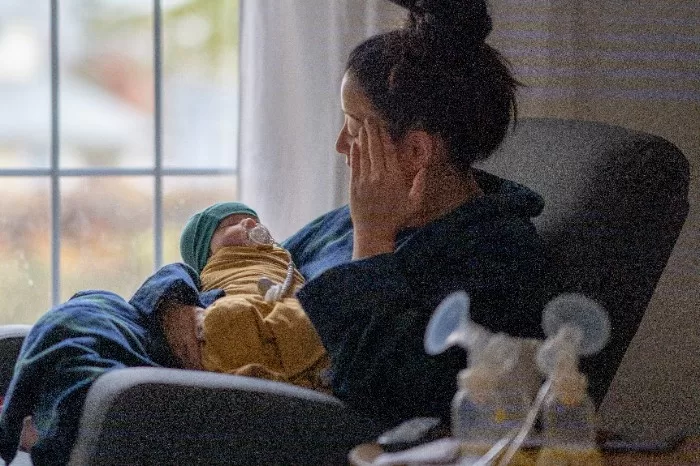
Motherhood is a beautiful and fulfilling experience, but it can also be physically and emotionally challenging. One of the most common challenges that mothers face is depressed mood also known as postpartum depression (PPD). PPD is a mental health issue that affects up to 1 in 7 women after giving birth. It is not the same as the baby blues and can have serious implications for both the mother and baby if left untreated. Coping with PPD can seem daunting, but with the right tools and a mental health provider, it is possible to recover and enjoy the rewarding experience of motherhood.
Who Are Affected by Postpartum Depression?

PPD can affect not only maternal mental health but also the health of the child. Children of mothers with PPD may exhibit developmental delays, experience difficulty in sleeping or feeding, and have behavioral problems. Infants who grow up in households with untreated PPD may experience developmental delays in language, motor, and cognitive development. As such, early diagnosis and timely treatment of PPD are essential for maternal and child health.
Baby Blues
While it’s normal for new mothers to experience some degree of the baby blues after childbirth, prolonged feelings of sadness, anxiety, and extreme fatigue are usually indicative of PPD. Baby blues are a mild and short-lived condition that usually resolves on its own within two weeks. New mothers may feel irritable and tearful and require some reassurance during this period. Baby blues are not considered a long-term condition and do not require treatment.
While baby blues are a mild and short-lived condition, postpartum depression can have more severe and long-lasting effects if left untreated. Women with untreated PPD may experience prolonged feelings of sadness, anxiety, and extreme fatigue which can interfere with daily functioning. In addition, untreated PPD has been linked to an increased risk of mental health issues such as anxiety disorders and psychosis. It is therefore essential for mothers to seek help from a mental health professional to properly cope with this condition.
Untreated Postpartum Depression
Untreated postpartum depression is a serious health condition that can have severe implications for both the mother and her family. Women with PPD may experience prolonged and often intense feelings of sadness, anxiety, and negative thoughts that can interfere with their daily functioning. Untreated PPD that can last longer than a year can increase the risk of mental health issues, including anxiety disorders and psychosis.
Experiencing Postpartum Depression
PPD can affect any new mother, regardless of age, race, or socio-economic status. However, some women may be more susceptible to developing PPD than others. Women with a history of depression and anxiety, those who have experienced complications during pregnancy and childbirth, and those with stressful life events may be at higher risk.
Affect on New Mothers
PPD is a complex condition that can affect any new mother, regardless of age or socio-economic status. However, certain risk factors can increase a woman’s susceptibility to this condition. Women who have experienced complications during pregnancy and childbirth, such as pre-eclampsia or premature labor, may be at higher risk of postpartum depression. These complications can lead to physical and emotional stress, which can trigger hormonal imbalances and affect a woman’s mental health.
In addition, women who have experienced stressful life events, such as a recent loss, financial difficulties, or relationship problems, may also be at higher risk of postpartum depression. These stressors can exacerbate feelings of anxiety and hopelessness that are characteristic of PPD, and can make it more difficult for new mothers to cope with the demands of newborn care.
Develop Postpartum Depression
Women experiencing PPD may exhibit a range of symptoms that can manifest physically, emotionally, and mentally. Some of the developed postpartum depression to look out for include:
- Feelings of sadness and hopelessness
- Loss of interest in daily activities
- Excessive crying spells or severe mood swings
- Changes in appetite and sleep patterns
- Fatigue and lack of energy
- Feelings of guilt and worthlessness
- Difficulty bonding with the baby
- Thoughts of self-harm or suicide
Seek Help for Postpartum Depression

PPD is a treatable condition, and recovery is possible with the right intervention. Mental health professionals can help new mothers develop a treatment plan that includes medication, therapy, and lifestyle changes. Social support networks, including family and friends, can also play an essential role in managing PPD.
It is estimated that 20%-30% of new mothers will experience some form of postpartum mood disorder that lasts beyond nine months. Postpartum depression can last for years but usually has a gradual onset and is not noticed until much later. This prolonged form of PPD often goes undiagnosed because its symptoms are often misattributed to other conditions such as chronic fatigue or sleep deprivation.
Cause of PPD
The cause of long-term postpartum depression is not well understood, which requires more research, but experts believe it could be due to a combination of biological and psychological factors. Hormonal changes following childbirth may play a role as well as unresolved issues during pregnancy or childhood trauma experiences. Women with pre-existing mental health conditions or those who have had a high-risk pregnancy may also be more likely to experience prolonged postpartum depression.
Furthermore, untreated PPD that persists over time increases the risk of further mental health issues such as anxiety disorders and psychosis which require specialized treatment approaches by mental health professionals. To ensure a successful recovery and prevent the possible negative repercussions associated with untreated PPD, early diagnosis, and timely treatment are essential for maternal and child health care providers alike.
Understanding Postpartum Depression
PPD is a type of depression that affects mothers after giving birth. It is caused by a combination of hormonal and emotional changes and can have a significant impact on a woman’s well-being. Unfortunately, many women are unaware that they have PPD or don’t understand how it affects them. As a result, they may not seek help or treatment in time which can lead to more serious complications down the road.
Symptoms of Postpartum Depression

The symptoms of postpartum depression can range from mild to severe and can start anytime in the first year after giving birth. Mothers with PPD may also experience changes in appetite, and sleep patterns, and have difficulty bonding with their babies. These challenges can include:
1. Feelings of sadness or hopelessness
2. Anxiety, irritability, and mood swings
3. Trouble bonding with the baby
4. Loss of interest in activities once enjoyed
5. Changes in appetite or trouble sleeping
6. Exhaustion or fatigue
7. Feeling overwhelmed or unable to cope with motherhood
8. Difficulties concentrating and making decisions
9. Thoughts of self-harm or harming the baby
Can Postpartum Depression Last for Years?
Postpartum depression can last from the first few weeks to several months after giving birth. Most women with postpartum depression will experience a full recovery within the first year. However, in some cases, the depressive symptoms of PPD can persist for years, resulting in long-term mental health issues. While most women will experience a full recovery within the first year, there are cases where PPD can last for years resulting in long-term mental health issues.
Short-Term Risk Factors
Several risk factors for short-term PPD include:
- Lack of social support: Studies show that women who lack a supportive partner, family, or friends are at greater risk of developing long-term PPD. Mothers need to have someone in their lives who can provide emotional support and encouragement during this time.
- Poor health: Women with pre-existing medical conditions such as diabetes, hypertension, and thyroid disorders are more likely to develop postpartum depressive symptoms that last longer than expected.
- Stressful life events: Unforeseen events such as financial issues, job loss, or a death in the family can increase the risk of developing long-term PPD symptoms.
Long-Term Risk Factors
Several factors can increase the risk of long-term PPD. These include:
- The severity of Symptoms: Women with severe PPD symptoms are more likely to experience long-term depression symptoms.
- Lack of Treatment: Women who do not seek or receive proper treatment for PPD may be at higher risk of continued depression symptoms.
- Personal or Family History of Depression: Women with a personal or family history of depression are more likely to experience long-term PPD.
- Chronic Stress: Women who experience chronic stress, such as financial problems or relationship issues, may be at higher risk of long-term PPD.
Coping with Long-Term PPD
Coping with long-term PPD can be challenging, but it is possible to recover with the right treatment and support. Some coping skills can include:
1. Develop a support network of family and friends
2. Practice self-care activities such as yoga, journaling, or meditation
3. Seek out counseling or therapy
4. Find an online community for postpartum depression support
5. Join a local postpartum depression support group
6. Exercise regularly to help improve your mental wellbeing
7. Take time for yourself to do things you enjoy like reading, watching movies, etc
8. Talk openly about your feelings with loved ones who understand the struggles of postpartum depression
9. Start writing down positive affirmations and reading them every day
10. Educate yourself on the signs and symptoms of postpartum depression
Self-Care Strategies for Coping with Postpartum Depression
In addition to seeking a healthcare provider, there are self-care strategies that you can adopt to help you cope with postpartum depression. Self-care involves taking care of your mind and body, which can help reduce your postpartum depression symptoms. Some self-care strategies include getting enough sleep, eating a healthy diet, exercising regularly, and practicing relaxation techniques such as yoga or mindfulness meditation. You may also find it helpful to enlist the support of your partner, family, or friends to help with household chores, childcare, or simply to talk about your feelings. Additionally, joining a support group can be beneficial in providing emotional support and understanding from other women who are facing similar experiences.
Seeking Appropriate Treatment for Postpartum Depression

It is important to seek help if you think you may have PPD. Many women feel ashamed or guilty about their symptoms and may be afraid to reach out for help. However, seeking help is a sign of strength, and it is essential for your recovery. Talk to your doctor or a mental health professional if you suspect you have PPD. They can provide you with a proper diagnosis and help you develop a treatment plan.
Appropriate Treatment Options for Postpartum Depression
It is important to seek a healthcare provider for help if you are experiencing PPD symptoms. PPD is a treatable condition, and recovery is possible. Treatment options for postpartum depression include:
- Talk therapy: Talk therapy can help women learn coping strategies to deal with their depression and anxiety.
- Medication: Antidepressant medicines or other medications may be prescribed by a doctor to help relieve the symptoms of PPD.
- Alternative therapies: Exercise, yoga, relaxation techniques and diet changes are all non-medical treatments that can help reduce the symptoms of PPD.
By understanding postpartum depression as a mother – what causes it, its symptoms, and treatments available – mothers who suffer from PPD can get the help they need to manage their condition and recover quickly and fully so they can enjoy their role as parents. If you or someone you know is experiencing symptoms of postpartum depression, it’s important to seek professional medical advice. With the right support and treatment, recovery from PPD is possible. It is important to remember that recovery from PPD takes time, but it is possible. With the right support and treatment, you can manage your symptoms and get back to living a healthy and fulfilling life.
Seeking Treatment for Postpartum Depression?
Coping with postpartum depression can be challenging, but with the right tools and support, you can recover and enjoy the experience of motherhood. Recognizing the symptoms of PPD and seeking professional help is the first step in your journey to healing. At Introspection Counseling Center, we offer postpartum depression therapy for residents of North Carolina, New Jersey, and Delaware.
We Are Here To Help
You are not alone, and it is essential to reach out to your support system for help. We’re passionate about helping moms who are experiencing postpartum depression break free from the thoughts and behavioral patterns that hold them back. Remember that seeking help is a sign of strength, and it is essential to the well-being of both you as well as your baby.
If you’re curious to learn more about our approach to therapy for new moms, we encourage you to reach out and schedule your free 15-minute consultation. We look forward to connecting with you and supporting you on your mental health journey!




